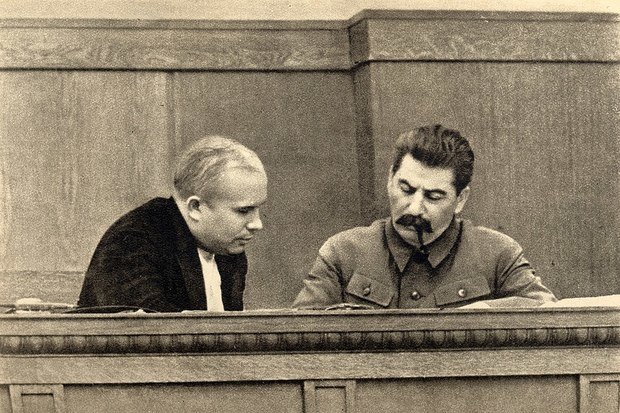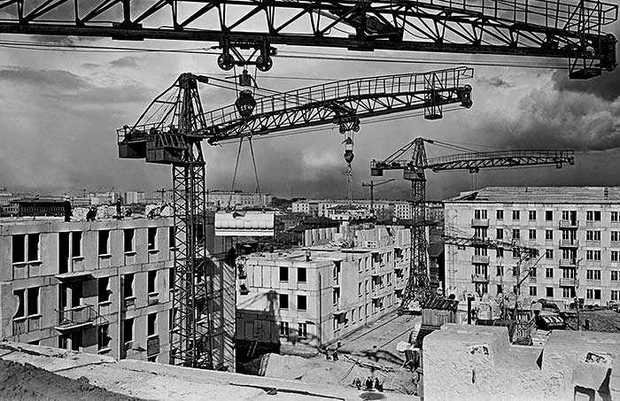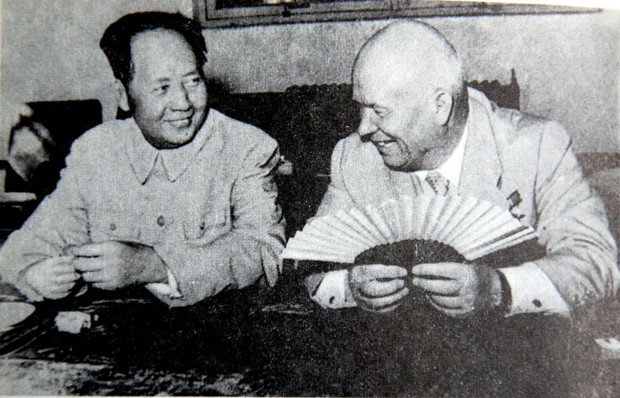''Khruschyov’s love for himself is an ever-lasting novel''
Historian Aleksandr Pyzhikov on why the rule of Nikita Khruschyov’s corn campaign and his personality are two different things
''Khruschyov decided to destroy the cult of personality with a sledgehammer. He took Stalin out of the Mausoleum and made the crack of the cult turn into an abyss, which created unsolvable problems for the Soviet system,'' author of the book about the Khruschyov thaw and Doctor of Historical Sciences Aleksandr Pyzhikov thinks. On the eve of the 125 th anniversary of the first secretary of the Central Committee, in an interview with Realnoe Vremya, he explained why it's hard to put his name in line with the concepts of ''successes'' and ''accomplishments''.
''He understood little about science and industry's problems''
Mr Pyzhikov, why are our citizens are inclined to underestimate the personality of Nikita Khruschyov as the head of the country despite his bright era – with flights to space and virgin lands, the first nuclear power plants and a report about Stalin's crimes?
Here it's obvious that Khruschyov's rule and his personality are two different things anyway. If we're talking about the decade when Khruschyov was chairing the country and the party, it's a logical continuation of the previous period. For instance, after the war ended, the USSR gave a huge impulse to develop industry and science, that's to say, the industrialisation was turning into scientific research, different scientific schools were created to develop the country progressively, as the world experience required it. For this reason, the successes in science and industry in the 1953-1954s and even in the Brezhnev era are a result of the foundation of successes laid by executives of science and technocratic ministers who chaired different sectors of the industry as early as under Stalin.
What does Nikita Khruschyov have to do with these successes? Actually, nothing because he is considered a specialist in agriculture (though, to be more precise, he was a party worker with an emphasis on agriculture), while this doesn't permit him to launch satellites or build nuclear power plants. So Khruschyov fell out of the number of those Stalinist technocratic ministers who were, in fact, charged with ruling the country.
Yes, shortly before Stalin's death, Khruschyov chaired the Moscow regional party organisation, but it changed nothing – he understood little about science and industry's problems or, to be more precise, they were strange to him. And let's remember here how he furiously and impulsively tried to dissolve the USSR Academy of Sciences – he constantly looked down on it and even tried to chair it with his poor education and the agricultural experience of the same quality! This experience was quite debatable, too – many of his contemporaries say if Khruschyov had knowledge in agriculture, he would unlikely have made such a step as sowing corn in our geographic latitudes. The country's development pace didn't correspond to Khruschyov's personality.

''Shortly before Stalin's death, Khruschyov chaired the Moscow regional party organisation, but it changed nothing – he understood little about science and industry's problems or, to be more precise, they were strange to him.'' Stalin and Khruschyov at USSR CC panel session (January 1936). Photo: wikipedia.org
Scientists, political experts and economists understand this. So why aren't millions of people who got a separate flat, countrymen who got passports, citizens who got a chance to breathe more easily than they could under Stalin ready to put Khruschyov above Brezhnev anyway?
Khruschyov had a lot of vacillation. It was his nature: he was very impulsive and prone to make hasty decisions. For instance, the de-Stalinisation. One could ask what citizens might complain about here. Khruschyov decided to unseat Stalin as a constructor of Communism, but immediately decided he should step onto this podium, which was welcomed sceptically not only by the same Soviet party officials but also by the population – the people understood that Khruschyov wasn't that good to become a strategist of a better future as a personality. But this didn't confuse him at all: he was full of enthusiasm, he said he was the person who would not only lead but also bring the population of the USSR to Communism, which caused laughter and all kinds of irony expressed in anecdotes.
Apart from that Khruschyov pretended to be a constructor of Communism, he loved being praised – on the one hand, he fought Stalin's cult of personality, on the other hand, he almost created his own cult of personality. And let's have a look at how many times the name of the first secretary was pronounced at CPSU sessions when Khruschyov was in power and how many times Brezhnev's name was pronounced at the same sessions. It will turn out that Khruschyov outran Brezhnev a bit in praising! This began in 1959, at the 21 st CPSU session, which was considered to be a session that won Socialism and, as Khruschyov thought, a beginning of the communist tomorrow.
If there were enough smart people who talked sense and made decisions on personalities among the CC officials after Stalin's death, why not the most authoritative ones won? Your colleagues-scientists say that Khruschyov was a standout, a countryman, what he captivated many people with, both ordinary people and party functionaries.
I wouldn't say that Khruschyov was that standout. Khruschyov won in the fight for the post of the country's leader because he managed to gather his supporters in June 1957. What a group of supporters was it? It was quite extraordinary, yes. Mr Khruschyov didn't possess great authority in the party. In addition, he had the role of jester under Stalin. And having understood he was especially unpopular in the RSFSR, Khruschyov made a correct emphasis – accent on the Ukrainian party organisation he chaired from 1939 to 1949. Even if half of his rule in Ukraine coincided with the war, Khruschyov understood that it was those people whom he could rely on. And even if they looked down on him and were sceptical, Khruschyov did his best to make them see him as a leader.
Very soon they saw him a person who could make a generous gift – I mean February 1954, that's to say, the annexation of Crimea to Ukraine. In the year of the 300 th anniversary of Ukraine's reintegration with Russia, this decision caused wild delight among the Ukrainian party economic officials. And as the first CC secretary, Khruschyov has many supporters at his disposal (by the way, this post wasn't key, it was just the fifth-sixth in importance). Khruschyov began to expand the influence of the CC, sent these supporters in – secretaries of regional committees and urban committees from Ukraine, and managed to shift the centre of the fight from the Council of Ministers, where he had no position, to the party's CC, he decided the outcome of the fight to his advantage.
You said that Khruschyov wasn't a specialist even in agriculture. What spheres was he good at?
Khruschyov was a specialist only in the construction of Communism – he thought he actually understood everything, made up a new CPSU programme, was very passionate about it, spent much time on it, taught others how they should live, how to build Communism. He dealt with these empty talks and considered the party could rule everything – the industry and even the army. He removed Zhukov from the post of minister of defence and claimed the latter understood nothing about military construction but the party and only the CPSU CC did, while the CPSU CC is me, Khruschyov. And this system where only the party ruled everything existed through Gorbachyov and began to dismantle only then. But he, Mr Khruschyov, built it.

''He was full of enthusiasm, he said he was the person who would not only lead but also bring the population of the USSR to Communism, which caused laughter and all kinds of irony expressed in anecdotes.'' Photo: citygu.ru
''He began to bother them, require them immediately to build Communism together with him. But they fed up with it''
By the way, as for Communism. Why was Khruschyov a fanatical fighter for Communism, almost the only among the country's officials?
He got it into his head that Communism was a reality, and only he, Khruschyov, could lead to it. And he sincerely believed that it did him a disservice. Why? After inviting the staff from the Ukrainian party organisation to the CPSU CC, he got people who decided they did the main job having supported Khruschyov in his fight for leadership. Khruschyov didn't think so – he thought he should build Communism. While his supporters didn't want any Communism and thought only insane people could do this kind of jobs. Khruschyov didn't calm down – he began to bother them, require them immediately to build Communism together with him. But they fed up with it and having advised in different places they made this architect of Communism retire in 1964.
Why didn't Khruschyov understand that Communism was unattainable, at least, while during his lifetime?
During all his trips across the country, Khruschyov saw only himself, while love for oneself is an ever-lasting novel. He wanted to rule not only the Academy of Sciences, you perfectly know that he also began to teach artists how to shoot a film, write verses, do paintings. And when a person allows such things, he is completely out of touch with reality.
Didn't Khruschyov really listen to competent people regarding the country's management?
This began at the 22 nd session of the party in 1961. And, in fact, in 1957 when Malenkov and a number of ministers retired. Khruschyov left only with Mikoyan who could support him. But those who could oppose and have some authority for Khruschyov were ''cleansed'' from the administration of the CPSU CC (only Khruschyov's people stayed there) and the Council of Ministers (many specialists were removed after the management reform).
''John Kennedy irritated him. He supposed he shouldn't talk with the person was still wet behind the ears''
Anyrulercanhaveperiodsofpeakpopularity. Did Khruschyov have a period of the people's popularity?
I wouldn't say he enjoyed people's popularity. But such a peak probably was in 1956 when Khruschyov delivered a report on the cult of personality. The majority of the people liked the report because the cult of personality was that crack in the country's foundation that they needed to fix. But Khruschyov decided to destroy the cult of personality with a sledgehammer – he took Stalin from the Mausoleum out and made the crack of the cult turn into an abyss, which created unsolvable problems for the Soviet system.
Why didn't the Brezhnev team manage to fix the country's foundation? Because people still believed the party.
The Brezhnev party was an edition of laymen, so to speak – they would never put effort for the sake of some good purposes. They thought that it was idiots' lot.

''Khruschyov tried to impose his opinion about the relationship of the countries on Mao Zedong: the Chinese leader said he was ready to understand and accept everything regarding Stalin. But then Khruschyov said he was the person China first of all needed. Mao didn't tolerate the teacher's tone of a mentor.'' Photo: russian7.ru
Molotov's grandson Vyacheslav Nikonov has recently said in one of the magazines that Khruschyov didn't have accomplishments on the international stage. Do you agree? If so, why?
In the liberal historical camp, Khruschyov is given credit for the pronunciation of the principle of peaceful coexistence of two systems – socialistic and capitalistic, which didn't exist under Stalin. But at the same time, they forget he almost triggered off the Third World War during the Cuban Crisis. Why did it happen so? Because the US president-elect Kennedy irritated him – he supposed he shouldn't talk with the person was still wet behind the ears, which made an impact on all relationship.
Khruschyov tried to impose his opinion about the relationship of the countries on Mao Zedong: the Chinese leader said he was ready to understand and accept everything regarding Stalin. But then Khruschyov said he was the person China first of all needed. Mao didn't tolerate the teacher's tone of a mentor, which transformed into a conflict that broke out at the state level. All these conflicts had a personal tone – a serious head of the country can't behave like that when dealing with foreign affairs.
Did Khruschyov know how to admit his own mistakes – in agriculture, in conflicts with other countries?
No, it was hard for him. It's said that he admitted mistakes in retirement, but with hindsight. But he didn't make even hint on it when in office.
What's the greatest achievement of Khruschyov?
Khruschyov pointed it out himself, he said in his memories: ''The most important thing is that they (Editor's Note: the CC praesidium) let me stay, they didn't shoot me to kill.'' This means such an outcome is my merit, what I founded when I refused the Stalinist generation and stopped destroying opponents physically. Khruschyov wrote he can be proud of it. This, of course, is a good outcome. But is it only Mr Khruschyov's merit? I think such a result could be in any case – if Khruschyov won or lost in the fight for power. Why? Because there weren't mass repressions after the war any more, the ''Leningrad case'' wasn't a mass story, and Stalin's other fellows didn't intend to reproduce the practice of the 30s.
At last, is Khruschyov a reformer?
Khruschyov is an improviser. If partiality is above all, it's not reforms. Khruschyov lacked knowledge and competence to carry out reforms.